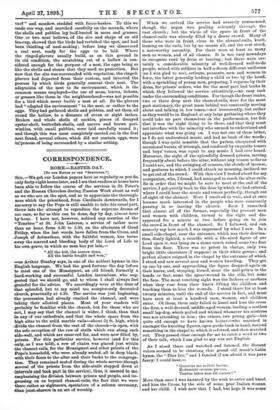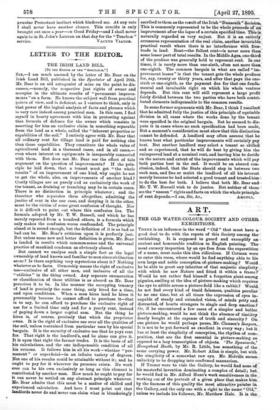CORRESPONDENCE.
ROME.—EASTER-DAY.
[To THE EDITOR OF THE " SPECTRTOR."] '&n,—We get our London papers here as regularly as you do, only forty-eight hours later, and I see that readers at home have been able to follow the course of the services in St. Peter's and the Roman Churches during Passion Week about as well as we who are on the spot, and so to appreciate the thorough- ness which the priesthood, from Cardinals downwards, for I am sorry to say the Pope is still unable to take his usual part, throw into the attempt to reproduce the supreme drama of our race, so far as this can be done, day by day, almost hour by lour. I have not, however, noticed any mention of the -"Tenebrx " at St. John Lateran, a service of rather more than an hour, from 4.30 to 5.30, on the afternoon of Good
Friday, when the last words have fallen from the Cross, and -Joseph of Arimathwa,, with the faithful women, has borne away the scarred and bleeding body of the Lord of Life to his own grave, in which no man has yet lain,—
" All the toil, the sorrow done,
All the battle fought and won,"
—as Arthur Stanley says, in one of the noblest hymns in the English language. We had the good fortune the day before to meet one of the Monsignori, an old friend, formerly a lard-working and successful London incumbent, who sug- gested that we should go, and to whom I shall always feel .grateful for the advice. We accordingly were at the door of that splendid, but to my mind too sumptuously decorated church, punctually at 4.30. The service was just beginning, the precession had already reached the chancel, and were taking their allotted places. Most of your readers will probably be familiar with the church, but for those who are "not, I may say that the chancel is wider, I think, than that in any of our cathedrals, and that the whole space from the high altar to the solid marble rails—about 31 ft. high, which 'divide the chancel from the rest of the church—is open, with the sole exception of the row of stalls which run along each side-wall, and which are reserved for, and were now filled by, priests. For this particular service, however (and for this ,only, as I was told), a row of chairs was placed just within the chancel-rails, for the Monsignori and other priests of the Pope's household, who were already seated, all in deep black, 'with their faces to the altar and their backs to the congrega- tion. They remained seated during the whole service (though several of the priests from the side-stalls stepped down at intervals and took part in the service), thus, it seemed to me, emphasising the division between priests and people, and im- pressing on us beyond chancel-rails, the fact that we were there rather as sightseers, spectators of a solemn ceremony, than joint-sharers in an act of worship.
When we arrived the service had scarcely conimenced, though the organ was pealing solemnly through the vast church ; but the whole of the space in front of the chancel-rails was already filled by a dense crowd. Many of those who were in front, close to the chancel-rails, knelt,
leaning on the rails, but by no means all, and the rest stood,
a noteworthy assembly. For there were at least as many men as women, and of all classes. It is not easy nowadays
to recognise rank by dress or bearing ; but there were cer- tainly a considerable minority of well-dressed well-to-do people, mixed with soldiers in half-a-dozen different uniforms (as I was glad to see), artisans, peasants, men and women in force, the latter generally leading a child or two by the hand, with a sprinkling of young men, preparing, I suppose by their dress, for priests' orders, who for the most part had books in which they followed the service attentively,—no easy task under the surrounding conditions. For though the front ranks, two or three deep next the chancel-rails, were for the most part stationary, the great mass behind was constantly moving about and talking in low tones,—not irreverently, but rather as they would be in England at any large gathering where they could take no part themselves in the performance, but felt that it was the right thing to be there, and that they must not interfere with the minority who seemed to understand and appreciate what was going on. I was not one of these latter, as I do not understand music, and had no book of the words ; though I was quite sensible that the pathos, chequered with occasional bursts of triumph, and rendered by exquisite tenors and boys' voices, was equal to any music I had ever heard. Moreover, the sight of the splendidly dressed priests, moving frequently about before the altar, without any reason so far as I could see, and the swinging of censors, the clouds of incense,
and gestures to which I could attach no meaning, inclined me to get out of the crowd. With this view I looked about for my
companion, who, I found, bad managed to reach the altar-rails. So in order that we might be sure to meet at the end of the service, I got quietly back to the door by which we had entered, where I could hear the music and voices perfectly, though out of sight of the chancel. Here I resolved to wait, and at once became much interested in the people who were constantly passing in or leaving the church. Soon I remarked that almost all of the former, especially the peasant men and women with children, turned to the right and dis- appeared for a minute or two before going on to join the crowd in front of the chancel. So I followed, and can scarcely say how much I was impressed by what I saw. In a small side-chapel, near the entrance, which was their destina- tion, dimly lighted, a crucifix with a life-sized figure of our Lord upon it, was lying on a stone couch raised some two feet from the floor. There was no priest in charge, only two bright little choristers (I suppose) in their white gowns ; and perfect silence reigned in the chapel by the entrance of which I stood and saw several men and women kneeling. They got up one by one, and approaching the figure dropped again on their knees, and, stooping, kissed, some the nail-prints in the hands or feet, some the spear-wound in the side, but none the face. The most touching sight was the fathers or mothers when they rose from their knees lifting the children and teaching them to kiss the wounds. I stood there for at least twenty minutes, until the end of the service in fact, and must have seen at least a hundred men, women, and children enter. Of these, three only failed to kneel and kiss the cross the first, a well-dressed, middle-aged woman, leading a restless small lap-dog, which pulled and whined whenever his mistress was not attending to him ; the others, two young girls—but quite old enough to have known better—who marched in amongst the kneeling figures, open guide. book in hand, noticed something in the chapel to which it referred, and then marched out. They passed close enough for me to catch a word or two of their talk, which I am glad to say was not English.
As I stood there and watched and listened, the distant voices seemed to be chanting that grand old monk's-Latin hymn, the 'Dies Ira," and I fancied (I am afraid it was pure fancy) I could hear,—
" Quterens me sedisti lassus, Redetuisti crucetti passus, Tantus labor non sit ca,ssus !"
More than once I was haunted by the wish to enter and kneel and kiss the Cross, by the side of some poor Italian woman and her child. I wish now that I had, but hope it was some
genuine Protestant instinct which hindered me. At any rate I shall never have another chance. This crucifix is only brought oat once a year—on Good Friday—and I shall never again be in St. John's Lateran on that day for the " Tenebi m"



















































 Previous page
Previous page